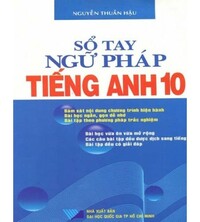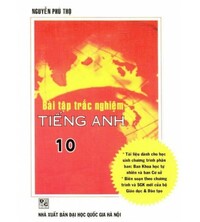4D - Unit 4. Our planet - SBT Tiếng Anh 10 Friends Global
1. Complete the facts with the superlative form of the adjectives in brackets and the correct answer, a, b or c. 2. Complete the sentences with the correct superlative form of the adjectives in brackets. Then circle in or of. 3. Rewrite the sentences using too or enough and the adjective in brackets. Do not change the meaning. 4. Complete the dialogue. Use too or enough with the adjective in brackets or the superlative form.
Bài 1
1. Complete the facts with the superlative form of the adjectives in brackets and the correct answer, a, b or c.
(Hoàn thành các dữ kiện với dạng so sánh nhất của các tính từ trong ngoặc và câu trả lời đúng, a, b hoặc c.)
1. The _____________________ (high) mountain in Europe is.
a. Elbrus
b. Everest
c. Kilimanjaro
2. The _____________________ (far) planet from the Sun is.
a. Earth
b. Mercury
c. Neptune
3. The _____________________ (deep) ocean is.
a. the Arctic
b. the Atlantic
c. the Pacific
4. The _____________________ (sunny) part of England is.
a. the north
b. the south
c. the centre
5. The _____________________ (polluted) city in the world is.
a. New York
b. New Orleans
c. New Delhi
6. The _____________________ (common) cause of a tsunami is.
a. an earthquake
b. a volcanic eruption
c. a storm
7. The country with the _____________________ (long) coast is.
a. Russia
b. China
c. Canada
8. The _____________________ (large) island in the world is.
a. Great Britain
b. Greenland
c. Iceland
9. The _____________________ (dry) continent in the world is.
a. Antarctica
b. Australia
c. Africa
Phương pháp giải:
Công thức của so sánh nhất
-
Tính từ ngắn: S + tobe + the + Adj + EST…
-
Tính từ dài: S+ tobe + the + most + Adj…
Chú ý có các tính từ ở dạng so sánh nhất không theo quy tắc như: good – the best; far – furthest…; các tính từ có đuôi “y” thường là tính từ ngắn như: happy, angry… => khi thêm “EST” nhớ đổi “y” thành “i” rồi mới thêm.
Nghĩa của các tính từ
- high: cao
- far: xa
- deep: sâu
- sunny: có nắng
- polluted: ô nhiễm
- common: phổ biến
- long: dài
- large: lớn
- dry: khô
Lời giải chi tiết:
| 1. highest - a | 2. furthest - c | 3. deepest - c | 4. sunniest - b | 5. most polluted - c | 6. most common - a | 7. longest - c | 8. largest - b | 9. driest - a |
1. The highest mountain in Europe is Elbrus.
(Ngọn núi cao nhất ở châu Âu là Elbrus.)
2. The furthest planet from the sun is Neptune.
(Hành tinh xa mặt trời nhất là Sao Hải Vương.)
3. The deepest ocean is thePacific.
(Đại dương sâu nhất là Thái Bình Dương.)
4. The sunniest part of England is the south.
(Phần nhiều nắng nhất của nước Anh là phía nam.)
5. The most polluted city in the world is New Delhi.
(Thành phố ô nhiễm nhất thế giới là New Delhi.)
6. The most common cause of a tsunami is an earthquake
(Nguyên nhân phổ biến nhất của sóng thần là động đất)
7. The country with the longest coast is Canada.
(Quốc gia có bờ biển dài nhất là Canada.)
8. The largest island in the world is Greenland.
(Hòn đảo lớn nhất trên thế giới là Greenland.)
9. The driest continent in the world is Antarctica.
(Châu lục khô hạn nhất trên thế giới là Nam Cực.)
Bài 2
2. Complete the sentences with the correct superlative form of the adjectives in brackets. Then circle in or of.
(Hoàn thành các câu với dạng so sánh đúng nhất của các tính từ trong ngoặc. Sau đó khoanh tròn vào in hoặc of.)
1. Birmingham is one of the _____________________ (large) cities in / of England.
2. Crocodiles are one of the _____________________ (dangerous) animals in / of the world.
3. The special effects are the _____________________ (bad) part in / of the film Terminator 2.
4. In Australia, the _____________________ (hot) month in / of the year is usually February.
5. The Dorchester is one of the _____________________ (expensive) hotels in / of London.
Phương pháp giải:
Công thức của so sánh nhất
-
Tính từ ngắn: the + Adj + EST…
-
Tính từ dài: the + most + Adj…
Chú ý có các tính từ ở dạng so sánh nhất không theo quy tắc như: good – the best; far – furthest…; các tính từ có đuôi “y” thường là tính từ ngắn như: happy, angry… => khi thêm “EST” nhớ đổi “y” thành “i” rồi mới thêm.
Giới từ in / of
-
In: ở (đất nước, thành phố…)
-
Of: của…
Lời giải chi tiết:
| 1. largest - in | 2. most dangerous - in | 3. worst - of | 4. hottest - of | 5. most expensive - in |
1. Birmingham is one of the largest cities in England.
(Birmingham là một trong những thành phố lớn nhất ở nước Anh)
2. Crocodiles are one of the most dangerous animals in the world.
(Cá sấu là một trong những loài động vật nguy hiểm nhất trên thế giới.)
3. The special effects are the worst part of the film Terminator 2.
(Hiệu ứng đặc biệt là phần tệ nhất của phim Kẻ hủy diệt 2.)
4. In Australia, the hottest month of the year is usually February.
(Ở Úc, tháng nóng nhất của trong năm thường là tháng Hai.)
5. The Dorchester is one of the most expensive hotels in London.
(Dorchester là một trong những khách sạn đắt nhất ở London.)
Bài 3
3. Rewrite the sentences using too or enough and the adjective in brackets. Do not change the meaning.
(Viết lại các câu sử dụng quá hoặc đủ và tính từ trong ngoặc. Không thay đổi ý nghĩa.)
1. This game isn’t easy enough for me. (difficult)
This game is too difficult for me.
2. We’re too young to go on holiday alone. (old)
__________________________________________
3. This bed is too hard. (soft)
__________________________________________
4. This film isn’t interesting enough. (boring)
__________________________________________
5. It isn’t warm enough to go to the beach. (cold)
__________________________________________
6. His family were too poor to go on holiday. (rich)
__________________________________________
Phương pháp giải:
Cấu trúc enough và too
-
Enough: S + tobe + Adj + enough + (for O) + to V (đủ)
Too: S + tobe + too + Adj + (for O) + to V (quá đến nỗi không thể)
Lời giải chi tiết:
1. This game isn’t easy enough for me. (difficult)
This game is too difficult for me.
(Trò chơi này quá khó đối với tôi.)
2. We’re too young to go on holiday alone. (old)
We’re not old enough to go on holiday alone.
(Chúng tôi chưa đủ lớn để đi nghỉ một mình.)
3. This bed is too hard. (soft)
This bed isn’t soft enough.
(Giường này không đủ mềm.)
4. This film isn’t interesting enough. (boring)
This film is too boring.
(Phim này chán quá.)
5. It isn’t warm enough to go to the beach. (cold)
It’s too cold to go to the beach.
(Trời quá lạnh để đi biển.)
6. His family were too poor to go on holiday. (rich)
His family weren’t rich enough to go on holiday.
(Gia đình anh ấy không đủ giàu để đi nghỉ.)
Bài 4
4. Complete the dialogue. Use too or enough with the adjective in brackets or the superlative form.
(Hoàn thành đoạn hội thoại. Sử dụng quá hoặc đủ với tính từ trong ngoặc hoặc dạng so sánh nhất.)
Kate: Now we join Brett Simpson for the (1)_____________________ (late) news about the wildfires. Brett, what’s happening?
Brett: Well, the police aren’t allowing us to get (2)_____________________ (close) to the fires, but I can feel the heat from here.
Kate: How are the people in the area reacting? It isn’t one of the (3)_____________________ (rich) parts of the country, is it?
Brett: No, it isn’t. Some people are (4)_____________________ (lucky) to have relatives in other cities, so they’re leaving. But many are (5)_____________________ (old) or (6)_____________________ (ill) to travel. They’re waiting and hoping.
Kate: What’s the (7)_____________________ (good) thing other people can do to help?
Brett: Well, I asked the police that question. They said the (8)_____________________ (helpful) thing is to stay away from the area. Thousands of people are coming here just to have a look. This is one of the (9)_____________________ (big) and (10)_____________________ (spectacular) fires for decades. But these people are getting in the way of the emergency services and their work. And their job is (11)_____________________ (difficult) without that!
Kate: What is the (12)_____________________ (likely) cause of the fire?
Brett: It’s (13)_____________________ (early) to say. Sometimes lightning can start a fire like this, if the trees are (14)_____________________ (dry). But of course, humans are the (15)_____________________ (probable) cause.
Phương pháp giải:
Cấu trúc enough và too
-
Enough: S + tobe + Adj + enough + (for O) + to V (đủ)
-
Too: S + tobe + too + Adj + (for O) + to V (quá đến nỗi không thể
Công thức của so sánh nhất
-
Tính từ ngắn: S + tobe + the + Adj + EST…
-
Tính từ dài: S+ tobe + the + most + Adj…
Chú ý có các tính từ ở dạng so sánh nhất không theo quy tắc như: good – the best; far – furthest…; các tính từ có đuôi “y” thường là tính từ ngắn như: happy, angry… => khi thêm “EST” nhớ đổi “y” thành “i” rồi mới thêm.
Lời giải chi tiết:
| 1. latest | 2. too close | 3. richest | 4. lucky enough | 5. too old |
| 6. too ill | 7. best | 8. most helpful | 9. biggest | 10. most spectacular |
| 11. difficult enough | 12. most likely | 13. too early | 14. too dry | 15. most probable |
Kate: Now we join Brett Simpson for the (1) latest (late) news about the wildfires. Brett, what’s happening?
Brett: Well, the police aren’t allowing us to get (2) too close (close) to the fires, but I can feel the heat from here.
Kate: How are the people in the area reacting? It isn’t one of the (3) richest (rich) parts of the country, is it?
Brett: No, it isn’t. Some people are (4) lucky enough (lucky) to have relatives in other cities, so they’re leaving. But many are (5) too old (old) or (6) too ill (ill) to travel. They’re waiting and hoping.
Kate: What’s the (7) best (good) thing other people can do to help?
Brett: Well, I asked the police that question. They said the (8) most helpful (helpful) thing is to stay away from the area. Thousands of people are coming here just to have a look. This is one of the (9) biggest (big) and (10) most spectacular (spectacular) fires for decades. But these people are getting in the way of the emergency services and their work. And their job is (11) difficult enough (difficult) without that!
Kate: What is the (12) most likely (likely) cause of the fire?
Brett: It’s (13) too early (early) to say. Sometimes lightning can start a fire like this, if the trees are (14) too dry (dry). But of course, humans are the 15 most probable (probable) cause.
Tạm dịch:
Kate: Bây giờ chúng ta tham gia cùng Brett Simpson để biết những tin tức mới nhất về các vụ cháy rừng. Brett: chuyện gì đang xảy ra vậy?
Brett: Chà, cảnh sát không cho phép chúng tôi đến quá gần đám cháy, nhưng tôi có thể cảm nhận được sức nóng từ đây.
Kate: Mọi người trong khu vực phản ứng như thế nào? Nó không phải là một trong những khu vực giàu có nhất của đất nước, phải không?
Brett: Không, không phải vậy. Một số người may mắn có người thân ở các thành phố khác nên họ sẽ rời đi. Nhưng nhiều người đã quá già hoặc quá ốm để đi du lịch. Họ đang chờ đợi và hy vọng.
Kate: Điều tốt nhất mà người khác có thể làm để giúp đỡ là gì?
Brett: À, tôi đã hỏi cảnh sát câu hỏi đó. Họ cho biết điều hữu ích nhất là tránh xa khu vực này. Hàng ngàn người đang đến đây chỉ để xem. Đây là một trong những vụ cháy lớn nhất và hoành tráng nhất trong nhiều thập kỷ. Nhưng những người này đang cản trở các dịch vụ khẩn cấp và công việc của họ. Và công việc của họ là đủ khó khăn nếu không có điều đó!
Kate: Nguyên nhân có khả năng xảy ra hỏa hoạn nhất là gì?
Brett: Còn quá sớm để nói. Đôi khi sét có thể bắt đầu một đám cháy như thế này, nếu cây quá khô. Nhưng tất nhiên, con người là nguyên nhân có thể xảy ra nhất.
Search google: "từ khóa + timdapan.com" Ví dụ: "4D - Unit 4. Our planet - SBT Tiếng Anh 10 Friends Global timdapan.com"







